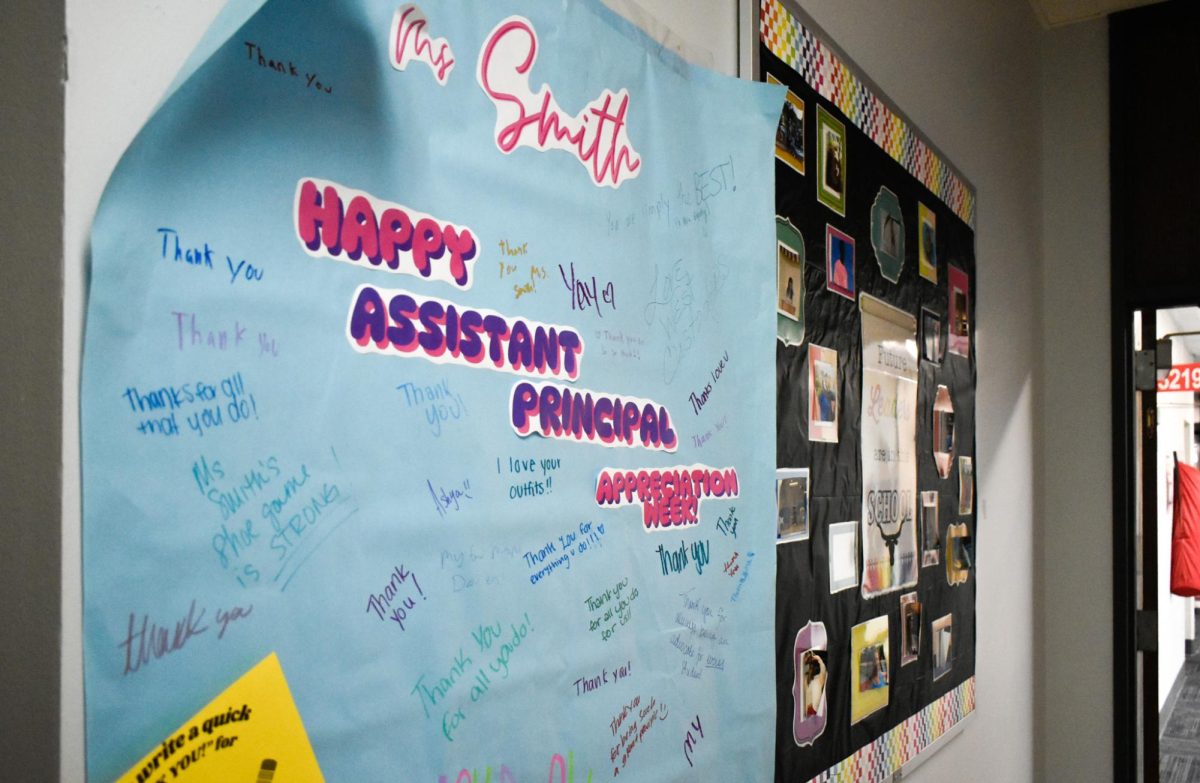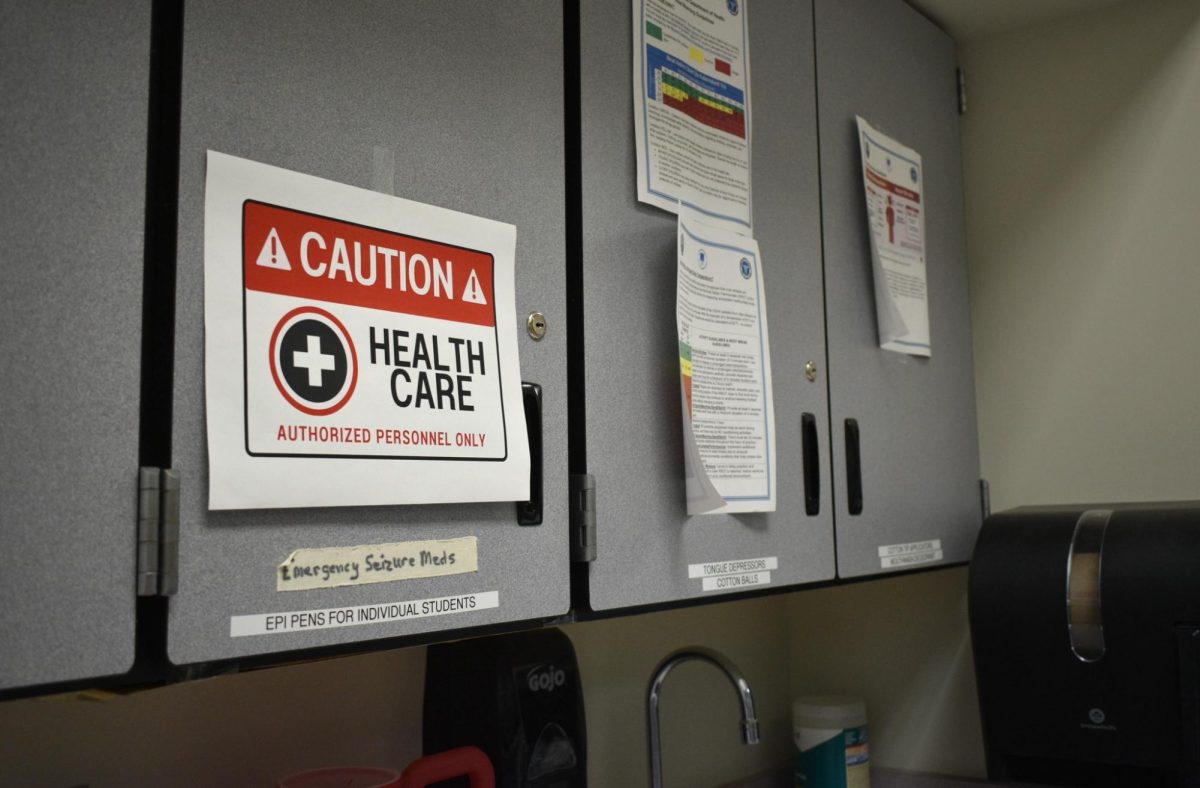Kicking off the 2023-24 school year, students were forced to say goodbye to study hall as the district removed it as an option for students. The decision wasnŌĆÖt well received by students, parents, teachers or counseling staff. Many raised concerns over lack of time, especially for students who work, play sports, take advanced classes or do some combination of the three.
For students identified with academic struggles ŌĆö such as those failing multiple classes, deficient in credits or who have been recognized by teachers and administration to need extra study time during the school day ŌĆö Academic Intervention Support Hour was created. With just 63 students enrolled in the course, there is currently a waitlist for students trying to get into the course ŌĆö and no one has moved up.┬Ā
ŌĆ£That process [of the waitlist] is still being formulated. WeŌĆÖre still getting emails from parents and itŌĆÖs hard to explain to them that we no longer offer [study hall],ŌĆØ building counselor Jennifer Wibbenmeyer said, ŌĆ£ThereŌĆÖs no option for [other students] right now, and thatŌĆÖs what scares me as a counselor. IŌĆÖm really worried about how some of these students are going to keep performing academically and find the success that they should be finding when they just donŌĆÖt have that time to commit to their studies.ŌĆØ
Not only is the lack of a consistent study period creating concern over academic performance, but itŌĆÖs also the reason many students are avoiding harder classes. Chemistry teacher Chloe Gallaher has been teaching at West for 15 years and saw several students this past year drop AP and Honors Chemistry classes to make up for the absence of study time throughout the school day.
ŌĆ£Having a study hall is a way [some students] acclimate to high school and the demands of homework and things that they didn’t have to in middle school. It’s a very different atmosphere that students walk into when they come into high school,ŌĆØ Gallaher said.
Many schools have recognized the need for a mandatory study hall. At Cantwell Sacred Heart of Mary High School, after a few months of holding a mandatory study hall, students’ overall GPA rose by 0.5%, and the number of honors students increased from 32% to 50%.
Thus, in a school that encourages students to take advanced classes, the lack of support being offered to kids is essentially setting us up to fail. Research students at Saint Xavier University found that homework is the top stressor for students around the country. This especially applies to students who cannot work at home.
ŌĆ£I haven’t been able to do much work on school nights at home because of the extracurricular activities that I’m doing every single night. So that forces me to [do] my homework in the car driving [to] places, takes away from my social life or ability to hang out with my friends on weekends because I’m too busy doing my homework,ŌĆØ sophomore Lila Kayser said.
On top of being a dancer who trains between three to six hours per school day, Kayser is enrolled in four advanced classes, which makes the discontinuation of study hall detrimental to her academic performance. Last year, she was enrolled in study hall both semesters and found them vital to her success in school. She is not an anomaly. The ERIC Institute of Educational Science found that a utilized study hall can reduce impending homework by 50%.┬Ā
To compensate for the removal of study halls, the administration hopes to emphasize AcLab by making the session more focused on academics to improve studentsŌĆÖ success in the classroom. However, AcLab is not a viable substitute for this at West since it continues to be co-opted as homeroom time, with classes often interrupted to practice emergency drills, attend class meetings, go to assemblies and participate in club meetings.┬Ā
ŌĆ£We used to have a homeroom time, where we met with students every once in a while,ŌĆØ Gallaher said. ŌĆ£It’s just a shorter time that we have where the sole purpose is to build connections with that teacher and they can kind of help watch grades and hold you accountable. That would be more beneficial than what we’re currently doing.ŌĆØ
While students tolerated the inconsistency of AcLab study time when they had a study hall option, now with their removal, the new lack of time to complete assignments and work in school is becoming a frustration for several students.┬Ā
ŌĆ£I’ve been a lot more stressed out and I feel overwhelmed because I have a lot of things that need to get done and not enough time to do that,ŌĆØ Kayser said. ŌĆ£I also stay up too late finishing my homework, and I’m not getting enough sleep.ŌĆØ
Furthermore, without study hall, students in programs like ŌĆ£Spark!ŌĆØ or ŌĆ£South TechŌĆØ that require them to be off-campus for a part of the school day face difficulties in terms of accessibility to teacher assistance.
ŌĆ£Spark! students don’t have a study hall, and they’re having to find different times to come in. Sometimes you can’t be available at the time [they want to come in], and then it’s the question of ŌĆśis the teacher going to be here? Is it too late? Do they have a family? Do they have to leave at 3 p.m.?ŌĆØ Gallaher said.
Although the district stated that their decision followed suit with other public schools in the city, such as Clayton, schools like Kirkwood still offer multiple forms of academic support for their students. Furthermore, schoolwide study time at Clayton is offered four times a week, double what is currently available at West.
This leaves us with the question: what do we do to remedy the lack of time and support for┬Āstudents? While thereŌĆÖs a multitude of steps we could take to help our students, separating┬Āhomeroom activities from a study hall is a vital initial step.┬Ā
ŌĆ£[Ac-Lab] is just forcing me to sit there when there’s work that needs to be done,ŌĆØ Kayser said. ŌĆ£Study halls were really nice because it was just quiet for an hour and a half, I could just sit there, knock out all my homework and get everything done. Versus in AcLabs, I feel like there’s [a lot of] movement, and the bell is ringing, and we’re going places. It takes away from being able to do your work without having to stop.ŌĆØ

![Beginning in the 2023-24 school year, Parkway discontinued study halls throughout the district. Concerned over the consequences it may have on their academic success, several students and teachers have spoken out against the elimination of a necessary tool. ŌĆ£Kids aren't abusing study halls to sit there on their phones or something. They might need [more support]. Just because you're not taking this amount of AP classes doesn't mean you're not being challenged, and just because you're not having ŌĆśXŌĆÖ amount of hours every night doesn't mean you have enough time to get homework done,ŌĆØ chemistry teacher Chloe Gallaher said.](https://pwestpathfinder.com/wp-content/uploads/2023/09/image1.jpg)

![Dressed up as the varsity girlsŌĆÖ tennis coach Katelyn Arenos, senior Kate Johnson and junior Mireya David hand out candy at West HighŌĆÖs annual trunk or treat event. This year, the trunk or treat was moved inside as a result of adverse weather. ŌĆ£As a senior, I care less about Halloween now. Teachers will bring their kids and families [to WestŌĆÖs Trunk or Treat], but there were fewer [this year] because they just thought it was canceled [due to the] rain. [With] Halloween, I think you care less the older you get,ŌĆØ Johnson said.](https://pwestpathfinder.com/wp-content/uploads/2025/10/DSC00892-1-1200x800.jpg)
![Leaning on the podium, superintendent Melissa Schneider speaks to Parkway journalism students during a press conference. Schneider joined Parkway in July after working in the Thompson School District in Colorado. ŌĆ£My plan [to bond with students] is to get things on my calendar as much as possible. For example, being in [classes] is very special to me. I am trying to be opportunistic [meeting] kids [and] being in [the school] buildings. I have all the sports schedules and the fine arts schedules on my calendar, so that when I'm available, I can get to them,ŌĆØ Schneider said.](https://pwestpathfinder.com/wp-content/uploads/2025/09/IMG_5425-1200x943.jpeg)


![Red, white and blue, the American flag holds the values of our democracy. The fight that we once endured has returned, as student journalists and senior correspondents across the country are losing their voices due to government control. ŌĆ£[Are] the White House and [the] government limiting free speech [and] freedom of the press? Yes [they are],ŌĆØ chief communications officer of the Parkway School District and former journalist Elisa Tomich said.](https://pwestpathfinder.com/wp-content/uploads/2025/03/Untitled-design-14.jpg)
![A board in the Parkway West counseling department displays pennants of selective universities. With a wide range of students interested in attending, itŌĆÖs important that these schools have clear priorities when deciding who to admit. ŌĆ£[Washington University] had the major that I wanted, psychology, philosophy, neuroscience. That's a holistic study of the brain, and [WashU is] the only college in the world that offers that. That's the main reason I wanted to go; I got into that program,ŌĆØ senior Dima Layth said.](https://pwestpathfinder.com/wp-content/uploads/2025/02/Flag-1.png)

![Within the U.S., the busiest shopping period of the year is Cyber Week, the time from Thanksgiving through Black Friday and Cyber Monday. This year, shoppers spent $13.3 billion on Cyber Monday, which is a 7.3% year-over-year increase from 2023. ŌĆ£When I was younger, I would always be out with my mom getting Christmas gifts or just shopping in general. Now, as she has gotten older, I've noticed [that almost] every day, I'll open the front door and there's three packages that my mom has ordered. Part of that is she just doesn't always have the time to go to a store for 30 minutes to an hour, but the other part is when she gets bored, she has easy access to [shopping],ŌĆØ junior Grace Garetson said.](https://pwestpathfinder.com/wp-content/uploads/2024/12/DSC_0249.JPG-1200x801.jpg)

![Senior Sally Peters stands in the history hallway, contemplating her choices in the 2024 United States and Missouri elections on Nov. 5. As a member of Diplomacy Club, Peters has discussed key candidates and issues in contemporary American politics. ŌĆ£[As students], we're starting to become adults. We're realizing how much the policies that are enforced and the laws that make it through the House and Senate are starting to affect us. [Opportunities such as] AP [U.S.Government] and Diplomacy Club [make elections feel] a lot more real,ŌĆØ Diplomacy Club vice president and senior Nidhisha Pejathaya said.](https://pwestpathfinder.com/wp-content/uploads/2024/10/Flag-1-1.png)

![Sophomore Shree Sikkal Kumar serves the ball across the court in a match against Lindbergh. Sikkal Kumar has been a varsity member of the varsity girlsŌĆÖ tennis team for two years, helping her earn the number two rank in Class 2 District 2.ŌĆ£When matches are close, itŌĆÖs easy to get nervous, but I [ground] myself by[staying] confident and ready to play,ŌĆØ Sikkal Kumar said.](https://pwestpathfinder.com/wp-content/uploads/2025/11/DSC2801-1200x798.jpg)
![Focused on providing exceptional service, sophomore Darsh Mahapatra carefully cleans the door of a customerŌĆÖs car. Mahapatra has always believed his customers deserve nothing less than the best. ŌĆ£[If] theyŌĆÖre trusting us with their car and our service, then I am convinced that they deserve our 100 percent effort and beyond,ŌĆØ Mahapatra said.](https://pwestpathfinder.com/wp-content/uploads/2025/10/DSC_0018-1200x800.jpg)
![Sophomore Aleix Pi de Cabanyes Navarro (left) finishes up a soccer game while junior Ava Muench (right) warms up for cross country practice. The two came to Parkway West High School as exchange students for the 2025-2026 school year. ŌĆ£The goal for the [exchange] program is to provide opportunities for both Parkway students and our international exchange students to learn about other cultures, build connections and become confident, capable, curious and caring ŌĆö ParkwayŌĆÖs Four CŌĆÖs ŌĆö in the process,ŌĆØ Exchange Program Lead Lauren Farrelly said.](https://pwestpathfinder.com/wp-content/uploads/2025/10/Feature-Photo-1200x800.png)
![Gazing across the stage, sophomore Alexis Monteleone performs in the school theater. The Monteleone familyŌĆÖs band ŌĆ£Monte and the MachineŌĆØ has been releasing music since 2012, but Alexis started her own solo career in 2024 with the release of her first single, Crying Skies. ŌĆ£My whole family is very musical, [and I especially] love writing [songs with them],ŌĆØ Monteleone said.](https://pwestpathfinder.com/wp-content/uploads/2025/09/DSC7463-1200x798.jpg)

![Leaping through the air, senior Tyler Watts celebrates his first goal of the season, which put the Longhorns up 1-0 against the Lafayette Lancers. Watts decided to play soccer for West for his last year of high school and secured a spot on the varsity roster. ŌĆ£[Playing soccer for West] is something I had always dreamed of, but hadnŌĆÖt really had a good opportunity to do until now. ItŌĆÖs [really] fun being out [on the field], and IŌĆÖm glad I decided to join the team. ItŌĆÖs just all about having fun with the boys and enjoying what time we have left together,ŌĆØ Watts said.](https://pwestpathfinder.com/wp-content/uploads/2025/09/DSC_1951-1200x855.jpg)
![Shifting global trade, President Donald TrumpŌĆÖs tariffs are raising concerns about economic stability for the U.S. and other countries alike. ŌĆ£[The tariffs are] going to pose a distinct challenge to the U.S. economy and a challenge to the global economy on the whole because it's going to greatly upset who trades with who and where resources and products are going to come from,ŌĆØ social studies teacher Melvin Trotier said.](https://pwestpathfinder.com/wp-content/uploads/2025/05/MDB_3456-1200x800.jpg)

![Pitching the ball on Apr. 14, senior Henry Wild and his team play against Belleville East. Wild was named scholar athlete of the year by St. Louis Post-Dispatch after maintaining a high cumulative GPA and staying involved with athletics for all of high school. ŌĆ£ItŌĆÖs an amazing honor. I feel very blessed to have the opportunity to represent my school [and] what [it] stands for,ŌĆØ Wild said.](https://pwestpathfinder.com/wp-content/uploads/2025/05/unnamed-6-1200x714.jpg)

Helena • Aug 29, 2025 at 1:14 am
Thank you for addressing this issue. This is happening at my school right now, and I strongly agree with the importance of having multiple study halls. I am glad I am not the only student who has felt diminished by the removal of them. I am scared for my future success, wanting to drop my hard classes, and more stressed then ever before. Hopefully with your article, I can convince my school to bring them back. Thank you.